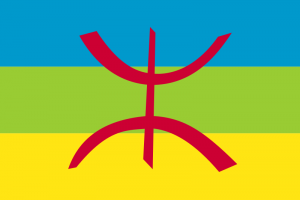Language/Standard-moroccan-tamazight/Culture/Eid-al-Adha
Eid al-Adha, which in Tamazight is referred to as "Idaougnidif" or the "Festival of the Sacrifice," is one of the most important religious holidays celebrated by Muslims throughout the world. In this lesson, you will learn about the Tamazight traditions and customs surrounding Eid al-Adha.
The Story of Eid al-Adha
Eid al-Adha commemorates the story of Prophet Ibrahim (known as Abraham in Christianity and Judaism) and his willingness to sacrifice his son Ismail as an act of obedience to God's command. According to the story, just as Ibrahim was about to sacrifice his son, God intervened and provided a ram as a substitute sacrifice instead.
Tamazight Customs and Traditions
Eid al-Adha is a time when families and friends come together to celebrate and share meals. In Morocco, the holiday is typically celebrated over several days, and preparations for the holiday begin well in advance. Here are some Tamazight customs and traditions surrounding Eid al-Adha:
Shopping for a Sheep
One of the most important customs associated with Eid al-Adha is the purchase of a sheep, which is traditionally slaughtered to commemorate the story of Abraham and his son. Families usually start looking for a sheep a week or two before the holiday, and prices usually go up as the holiday approaches.
Sacrifice of the Sheep
On the day of Eid al-Adha, the sheep is slaughtered by a male family member who has undergone training on how to perform the sacrifice according to Islamic religious laws. After the sheep is slaughtered, the meat is distributed among family, friends, and the poor.
Eid Prayers
Eid al-Adha is also a time for prayer and reflection. Muslims typically gather in the morning for a special prayer called "the Eid prayer." After the prayer, people exchange greetings and well wishes, and children usually receive gifts and candy.
Family Gatherings and Feasts
The rest of the day is typically spent in a festive mood, with families and friends coming together to enjoy meals of sheep meat and other traditional dishes such as "msemmen" or "baghrir." It is also a time for exchanging gifts and visiting relatives.
Vocabulary
Here are some Tamazight words and phrases related to Eid al-Adha:
| Tamazight | Pronunciation | English |
|---|---|---|
| Idaougnidif | ee-daw-gh-nee-dif | Eid al-Adha |
| Ihammaren | ee-ha-ma-ren | Sheep |
| Izemmawen | ee-zem-ma-wen | Gift |
| Asseggas | as-seggas | Year |
| Tazwart | ta-zwar-t | Celebration |
Conclusion
Eid al-Adha is an important holiday in the Muslim calendar and is celebrated by Tamazight-speaking communities throughout Morocco. It is a time for prayer, reflection, and festivity, and provides an opportunity for families and friends to come together and share traditional dishes and gifts.

